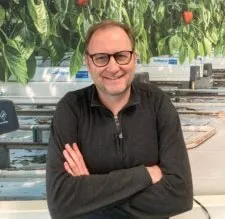Saint-Gobain and Cultilene set the bar high when it comes to sustainability: “We are trying to reduce our CO2 emissions in all kinds of ways,” says Patrick Pennings, manager of physical distribution and procurement at Cultilene. “Road transport currently still accounts for a substantial part of these emissions. Large numbers of trucks drive backwards and forwards between our factory in the Czech Republic and our production site in Tilburg, for example. We make large stone wool boards – the base material we use for our cubes and slabs – in this Eastern European country. They are then turned into a finished product in Tilburg.”
Setting up a rail connection
According to Patrick, shipping by road generates three times more CO2 emissions than shipping by rail. Early last year, he, therefore, decided to look into the possibility of switching partly to rail transport in the future. “It sounds easier than it is. You see, there is currently no rail connection between Brabant and the Czech Republic. And for such a connection to be cost-effective, you need to be able to run a full train several times a week. As Cultilene, we can’t do that on our own; we need to get other partners on board.”

So Patrick contacted Logistics Community Brabant, a non-profit organization for innovation in transport. “Under the banner of Top Sector Logistics’ national Joint Corridors Off-road action program, they have set up a project to create a train connection between Tilburg and the Czech Republic.”
Keeping the planet liveable
The project has already caught the attention of a number of other companies looking to have goods shipped between Brabant and the Czech Republic by rail. “We hope to get enough volume together to be able to set up a connection. Maybe this year, otherwise, next year. This will enable us to significantly reduce our carbon footprint and help keep our planet liveable. Rail transport is definitely the future, and without question for shipping goods between the Saint-Gobain factories in Europe.”
More sustainable on the road
Besides making rail transport more sustainable, Cultilene also want to do the same for road transport. “In the shorter term, that will involve using more sustainable fuels and training drivers to drive more economically, for example,” says Patrick. “In the longer term, we will also start using electric trucks. So we will be making a difference that way, too – after all, the impact we make starts with ourselves. This is one way we can really put Cultilene’s slogan – ‘Where impact begins’ – into practice!”
For more information:
Cultilene
cultilene.com
